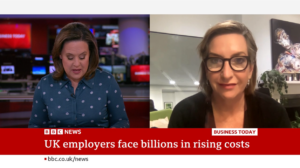From Kate Lester, Founder and Chief Executive, Diamond Logistics
“Lower unemployment and higher wages”, says Rachel Reeves, under Labour. I don’t think so. And I hope I’m wrong.
I was lucky enough to feature on BBC Business News yesterday morning being interviewed about the impact of the impending increases in National Insurance and the living Wage.
UK Business Cost Increases (15:49 – 19:51)
- New UK financial year bringing increased costs for households and businesses
- Water bills, energy prices, and local taxes all increasing
- National Living Wage rising to £12.21/hour (6.7% increase), with up to 18% increase for younger workers
- Business property tax increasing by £1.5 billion according to analysis
- Employer National Insurance contributions rising, costing companies an extra £25 billion annually
At Diamond, we calculated fiscally it’s going to cost us £50,000 at HQ alone. But if you extrapolate that out throughout our network partners (40 network partners soon to be live on our technology platform Despatchlab) around the country, then you’re talking about costs in excess of £1.8 million based on average amount of employees.
So what changes have we had to put in place? I think the same as the rest of our network partners. We’ve had to put a hold on new employment. And not replaced leavers. I think the Labour government promised a lower unemployment and higher wages and I think the consequence of their actions is going to be the absolute opposite of that. Whilst culturally speaking, we don’t think that the rise in the minimum wages is problematic, that accompanied with the new national insurance has just meant that we’ve had to a freeze in new employment to balance the books. Diamond is lucky because we are so technologically enabled our headcount is very low (with exceptional people to earning ratios) but for people that are very much client facing industries; caring or hospitality for example, this is going to be devastating.
Will This Stifle Business Growth?
I was asked if this then means will we maybe be holding off on expansion or will we still be growing in this environment? And the short answer to that is hopefully no. We’ve grown organically about 17 to 20% per annum in the last year. But that’s extraordinary growth compared to the rest of small to medium sized enterprises, who are our clients. Small to medium sized enterprises make up 99.9% of the UK economy. And I think for most clients we’ve seen a contraction of their expenditure. Logistics is a very good barometer of SME confidence and consumer confidence. And whilst we’ve continued to exponentially increase our client number, now totalling over a thousand SMEs around the UK, we have seen their individual spend drop between 20 and 25%. So I think there’s quite a lot of impact there.
Ms Reeves, you are betting on growth to increase your tax revenues to support your plans for rightly investing in the NHS, education and, dare I say it, defence. You aren’t going to get that growth if you kill the golden goose that can produce the eggs. Entrepreneurs can fiscally rescue this country if you empower them to make money. You can’t raise their costs exponentially, make tax credits on R and D impossibly difficult to claim back for legitimate companies and annihilate incentives with high taxes to make gains by selling their businesses and on corporate profits and expect a modicum of enthusiasm. You want to be bold? Try this:
- Reduce corporation tax to 15% and attract global players to the UK
- Increase entrepreneur relief to £10m to encourage SMEs to build and sell great business – fast
- Reduce (if not eliminate) employs NI – it is a tax on employment. You will find people will employ more people to grow faster
- Reinstate legitimate ease in R and D tax claims – empower people to invest in development
- Revoke your plans for inheritance tax on family farmers
I welcome your thoughts.





